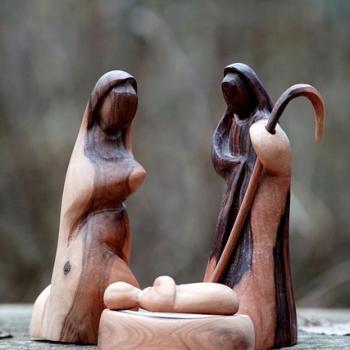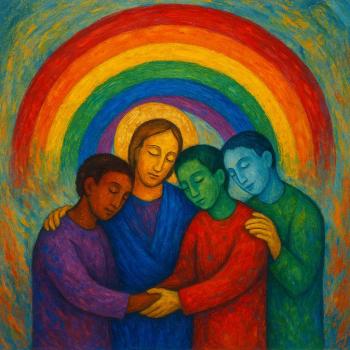Divinization is participation in the life of God. Christians believe that the condition for the possibility of this participation is the Incarnation of God in Christ. God makes this possible for us by accepting for himself a human nature and living a real human life. God's condescension to accept a human nature elevates humanity in a way that would never be possible even if it were through the purest of motives or the most excellent of our efforts.
I call this divinization through Christ the greatest humanism because no ideology or philosophy gives human nature this kind of ontological heft. Human persons have dignity, not just because we are uniquely capable of rational thought or possess intellectual prowess that exceeds all other creatures, but because God united his divine nature to our human nature in Christ.
As far as humanist concepts of self-actualization, these can only take us so far and they never take us never far enough. We always run into the limits that a human nature imposes by the very fact that it is fallen and finite. We can aspire to divinity, but there is an infinite, qualitative difference between a human and a divine nature that cannot be overcome from our side. This is why self-actualization is, in the end, an exercise in frustration. We end up grasping at a reality that must in the end be given, not seized or earned. God wants to give us this gift in Christ, but will we accept it? and if we accept it, what will we do with the gift?
It seems to me Catholicism is a religion that the very young and the very old have no trouble "getting." Children intuit mystery very easily and the old come to terms with it when they realize that all they have learned has only shown them all they do not know. Your book seems like a way to help the rest of us find a way to plug back into understandings and insights we tend to lose in our adolescence and sometimes never recapture.
We have a receptivity and sensitivity when we are children in regards to the Faith that can easily be dulled as we grow older. I would say that there are certain basic elements that constitute the grammar of the Faith that should be learned and experienced early on (for example, that God took for himself a human nature in Christ) that help us to understand and to speak the language of the Faith and navigate the culture of the Church. The profundity of the Church's claim are evident to us even when we are very young despite the fact that we lack a mature understanding that can appreciate all the implications.
And the mystery begins with the Incarnation, which unfurls with a thread of paradox running through it: We are sentimental about childhood, but Jesus is a true infant warrior; we are obsessed with credentials, Jesus is an authority without the paper; we look for and expect faux humility, Jesus asks, "who do the people say I am?" How does this Incarnated Christ speak to our modern sensibilities and our entrenched opinions? How do we have a relationship with this being?
The Incarnate Christ presents his grace to us moderns in much the same way that he presented himself throughout the history of Israel, by which I mean that he is able to move deftly around our resistance, even going so far as to use our resistance as the very means by which he draws us to himself. How do we have a relationship with him? The relationship we are offering is in, through, and with Christ and this is astounding. I think that the fact that the Lord permits us to have a relationship with him at all is what is truly remarkable (and perhaps it is coming to terms with this is what so many moderns find difficult to bear). But he does—and that reveals something of extraordinary import about both the Lord and about us.
You write that the resurrected Christ typically did two things: he "showed his wounds and pronounced a word of peace." Is that a kind of invitation to us? Is there an invitation to the path of peace wrapped up, somehow, in our wounds? Does that make Christianity a communion and community grounded in mysteries of sin and forgiveness?
Perhaps. We all bear the wounds of sin and that Christ chooses to bear such wounds is worth serious reflection. But I do think that Christ demonstrates in the display of his wounds the futility of our violence when placed in opposition to divine justice. His wounds display that all the power that humanity could muster to destroy God's love ultimately proved itself to be ineffectual; and not only that, but God in Christ transformed that hideous rejection into the occasion by which he would manifest his beautiful mercy to the world for all ages to come. The Church bears this mystery into the world in the practice of her Sacraments, which are all, each in their own ways, an immersion into the grace that is given through the Cross.
I think that modernity captivated our culture with the promise that the past could be dispensed with; or rather than looking to the past for what we have learned, we should lose ourselves in a march toward a future that is yet to be realized. Despite the hypnotic allure of this promise, it ultimately proves to be empty. The past is in us, and to reject the past without discrimination is to empty our lives of truths that are essential. The past is not a bad thing; it is in fact a wonderful resource for us in the present and for the future. I think that we can extend Pope Benedict's recent insights about a hermeneutic of continuity to the value that Catholicism places on "never throwing anything out." The Church rejects the rupture that modernity insists that we accept in regard to the relationship of the past to the present and the future.





